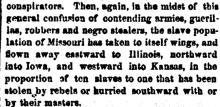The Missouri Elections––Emancipation in the Border Slave States.
The emancipationists have carried four or five of the nine members returned for Congress from Missouri by the late elections of that state. The same party have made a vigorous effort for the State Legislature, and they have almost succeeded in securing it against the hitherto invincible democracy. These results indicate a political revolution as remarkable as that which has just overthrown the republican radicals in New York; but wit a little inquiry into the subject it will be seen that the people of Missouri, in the election of these emancipation members to Congress, have by no means endorsed the slavery exterminating policy of the abolition radicals, but the widely different schema of President Lincoln's compensative emancipation, and for very good reasons.
Of all the border slave States, excepting Virginia, the State of Missouri has suffered the most severely from this war, and especially in the losses of her slave property and in the decisive consequences against the continuance of the institution within her borders. The State has been two or three times overrun by rebel armies, under Price and his Arkansas associates, and with each explosion they have carried off a lot of negroes. Rebel guerrillas have also made very free with the slaves of Unionists, and Kansas jayhawkers have liberated by hundreds the slaves of secession sympathizers and conspirators. Then, again, in the midst of this general confusion of contending armies, guerrillas, robbers and negro stealers, the slave population of Missouri has taken to itself wings, and flown away eastward to Illinois, northward into Iowa, and westward into Kansas, in the proportion of ten slaves to one that has been stolen by rebels or hurried southward with or by their masters.
All these causes, operating together, have materially diminished the cash value of slaves, and their habit of obedience, and the security of the institution in Missouri. At the same time the great European stream of immigration, pressing westward, and overflowing the surrounding free States, have invaded and diffused itself over Missouri, and is steadily crowding therein African slave labor to the wall. Slavery in Missouri is reduced to the exhausting pressure of all these elements of internal strife and competition, when President Lincoln submits to Congress his scheme of buying out the institution in all the border slave States. And this, including the absence of twenty or thirty thousand pro-slavery voters in the service of the rebellion farther South, is the true solution of these late emancipation successes in Missouri. That which was apparent in the reign of peace has become inevitable from revolutionizing war. The manifest destiny of Missouri is that of a free State. Her people, therefore, are rapidly coming over to President Lincoln's border State policy of emancipation, and probably in their next elections they will settle the question in his favor.
The late election of the administration candidate for Governor in Delaware involves the same conclusion––that the people of that State, in which African slavery is nearly extinct, are disposed to sell out their remnant of the institution at half price, as a thing which has ceased to pay expenses. Maryland is evidently inclining in the same direction. Virginia, with her slave population already swept off from one half of her "sacred soil" by this war, cannot emerge from it without taking upon herself the work of emancipation. And so with Kentucky, although her loyalty to the Union has prevented any general stampede of her slaves. We dare say that, if the Union were restored by New Year's day, not only the States indicated but even North Carolina and Tennessee, would realize their true policy to be the gradual removal or emancipation of their slaves, and the substitution, as far as practicable, of free white labor.
But in crossing the Southern boundaries of North Carolina and Tennessee we enter into a semi-tropical and miasmatic region, in which the Southern system of Africa slave labor, in the production of rice, cotton, sugar, &c., cannot be supplanted by any other system without the most serious consequences to whites and blacks, and the agricultural products of the States concerned. And here is the distinction between the emancipation policy which is gaining such headway in Missouri and the emancipation programme of our abolition radicals. The one is a local and limited policy, seeking its object in a quiet, orderly and business-like way; the other is the revolutionary policy of a sweeping abolition crusade, by fire and sword, reckless of consequences. In these late elections, therefore, the abolition radicals have gained nothing in Missouri. It is the compensative emancipation policy of President Lincoln that is there gaining ground, in this view we hope that he will repeat his original recommendations upon the subject in his forthcoming annual message to Congress.
"The Missouri Elections - Emancipation in the Border Slave States," New York (NY) Herald, November 16, 1862, p. 5.

